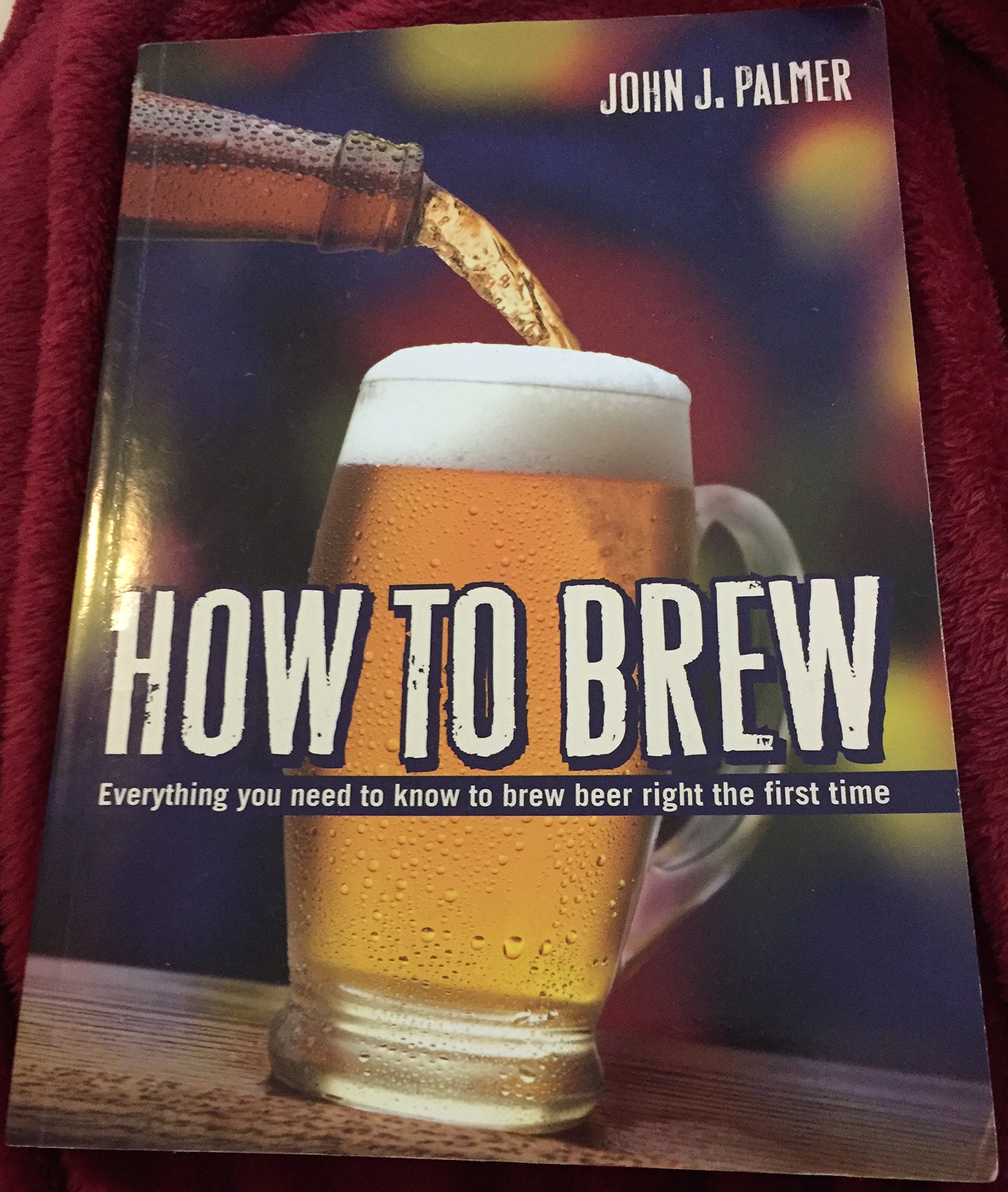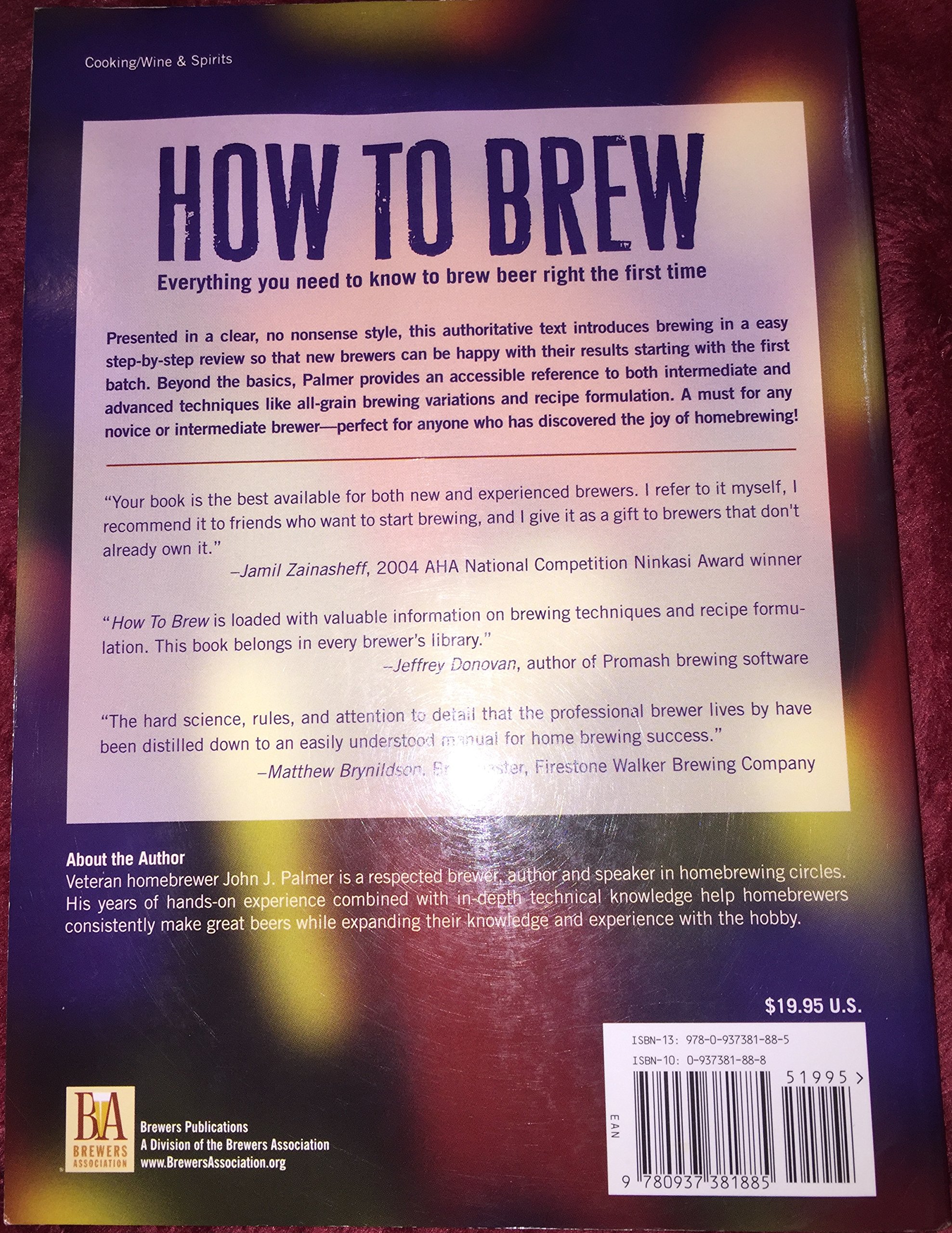Some deliveries may take a little longer than usual due to regional shipping conditions.
Customer Services
Copyright © 2025 Desertcart Holdings Limited



Full description not available
K**N
Great book full of information
This book is great. I started home brewing a year ago after getting an extract kit for Christmas. I knew nothing about it. I followed the instructions in the kit and the beer turned out pretty darn good, I guess I lucked out. Wanting to learn more about the process, I bought this book. I read most of the book pretty quickly, but was overwhelmed with the amount of information for a newbie. I only focused on information that I could understand at my level at that time and information that related to my extract brewing. Home brewing is a process of learning. You are not going to read this book and know everything about home brewing. For example, when reading the section on yeast, I couldn't really grasp all of the different types of sugars and how yeast consumes each one when I fist read the book. To be honest, it wasn't necessary in the beginning. I could understand how oxygenating the wort before pitching the yeast helps it reproduce and why maintaining a certain temperature was important. Then I eventually moved on to all-grain brewing and started reading the book again. The second time, I started understanding why having a starter is important and now make a starter every time. As I read the material a third time, I can really focus on the more advanced stuff.Overall, if you think you are going to read this book and understand it all the first time through, you might be disappointed. If you are already an advanced brewer, then you might be disappointed (but please don't give it a poor rating because of that, the title clearly explains it is a beginner's book). I use it as a reference now and reread stuff when I want to gain more of an understanding. I can't believe I missed First-Wort hopping the first two times I read the book, but then again, it didn't matter at first, I just needed to focus on elementary hopping techniques. Now that I am getting more advanced, I can use the First-Wort hopping technique and understand why I would may want to use it.Anyway, great book and it will probably be critical in my continuing education on brewing. I would recommend it for anyone just starting out or wanting to move on to all-grain from extract brewing.
A**E
The Classic Homebrewing Reference
If I were going to teach a college class on homebrewing, this would be my textbook. Pound for pound, How to Brew provides more technically accurate brewing information than any other book in its class. Do not let that scare you: John writes with a no nonsense style, but it is a clear and concise style that is easy to understand. When I have a specific brewing question, I reach for this book. It has a logical, topical organization that makes finding specific information easy, as well as a well-developed index. Chapter 1 starts out with a simple extract brew, and takes the reader step by step through the process using "beginner level" equipment. Once the reader has a grasp on the very basic elements of homebrewing, the book turns to specific topics such as sanitation (Chapter 2), working with malt extracts and beer kits (Chapter 3), water considerations for extract brewing (Chapter 4), understanding hops and hop specifications (Chapter 5), the care and feeding of brewing yeast (Chapter 6), boiling and cooling wort (Chapter 7), the fermentation cycle (Chapter 8), and so forth all the way through bottling (Chapter 11). Section 2 introduces the intermediate brewer to specialty grains and some technical issues of working with malted barley. Adjuncts such as oats, corn, and rice are also introduced. The reader is also introduced to "how to read a malt analysis sheet" in this section. The mechanics of steeping are also explained. The section ends with an example batch that brings together all of the information presented in that section for the reader. The third section delves into the mysterious world of all grain brewing. Technical topics like how a mash works, understanding the effects of pH on the mash, various mashing methods, lautering methods, and expected yields are all discussed. Despite the technical nature of this material, John does a good job of translating it into plain English. The fourth section delves into beer flavors, both good and bad. Recipe design is discussed, as are common flaws and off flavor in beer. This is the part of the book where a few recipes are offered along with comments on cross section of historical beer styles. This final section contains eight appendices that provide valuable information on such diverse topics as brewing metallurgy, lauter tun design for fly and batch sparging, building wort chillers, beer clarity and color, and using hydrometers and refractometers. Simply put, this book should be a part of every homebrewer's library. It is an excellent guide for the beginner, and an excellent reference for the accomplished brewer. Unlike many "beginner" books that become clutter once you get your feet wet, How to Brew will prove useful no matter where you are in your progress toward becoming a master [email protected]
G**A
if your interested in home brew...it's worth the read
I am just getting into the hobby of home brew. I research everything before I jump in...making this my 2nd book on the hobby.(home brewing for dummies was 1st...and excellent I might add!)"How to brew" really goes into detail on the hobby, from making starter cultures to reading a water analysis report from your water supplier. While I did learn quite a bit from reading this book and will use it as a reference in the future...I had a few disappointments too.PROS:1. Really in depth information2. Gives mathematical formulas to figure out different aspect of beer, like gravity and color.3. Directions for extract brewing and all grain brewing.4. Directions how to build some of your own equipment..like wort chillers and lauter tuns.CONS:1. Not many recipes2. Hop and yeast choices really incomplete, and only generic information on the ones listed.3. No description of different beer style or how to brew them.4. Directions can be a little hart to follow and are a little dated.5. Needs more pictures to help the reader follow.The cover of the book says, "how to brew beer right the first time". So, all of us beginners might find it hard to follow...so I don't recommend it as a 1st book. I do recommend, "Home brewing for dummies" as a 1st book, and I also recommend "beersmith 2" software to download onto your computer, It has all of those calculations I mentioned before all built in...making home brew easy and fun.
J**Z
Muy útil para iniciar Homebrew.
Tiene todo para iniciar en cualquier nivel. Desde lo básico y hasta el todo grano.
A**S
Excelente!
Tradicional livro para o cervejeiro caseiro. De grande utilidade. Passa por todos os passos do processo e com riqueza de detalhes.
G**I
Ottima lettura
Ottimo libro, sia x chi inizia, sia x chi è già pratico.Spazia bene tra tutti i campi dell'argomento homebrewing, senza divenire estremamente tecnico e poco accessibile.Se ci fosse anche tradotto, lo comprerei di sicuro!
S**N
Fantastic book - if you're interested in homebrewing, this is the only book you need
This book is excellent and possibly *the* authoritative book on the general topic of homebrewing.Chapter 1 begins with, to paraphrase, "you're probably standing in your kitchen with a beer kit and just want to get started, so keep reading". Subsequent chapters cover broad topics: water, yeast, hops, troubleshooting a bad batch, how to keep a good journal of your brewing, etc.If you take a look at some of the popular homebrewing channels on YouTube, you'll often see this book, or the author himself lecturing or being interviewed about pretty advanced homebrewing topics.The writing style is clear and concise and Palmer gets to the point quickly. It's invaluable if you just need information and aren't interested in reading through citations or a bunch of unnecessary background information. The writing is often humorous and the general tone across the book is light-hearted. The author takes brewing seriously, but doesn't take himself seriously, and it's refreshing to read a book in that style.
A**R
A beginners guide to brewing
If you want to start brewing beer then read this first. Even just the first chapter. The more you progress: extract, specialty grains, all grain, the more you can read. Chapters on everything you need to know, from yeast, hops, sanitisation, and even the importance of water! The information ranges from beginner to advanced. Read it!
Trustpilot
1 month ago
3 weeks ago